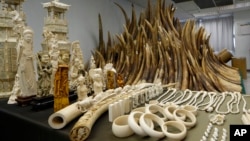Tanzania has sentenced four Chinese men to 20 years in jail each after they were convicted of smuggling rhino horns, part of a crackdown in sub-Saharan Africa on lucrative illegal poaching of protected wildlife.
The East African country, which relies heavily on revenues from safari tourism and new President John Magufuli has pledged to root out poaching as part of a wider war on corruption.
The Mbeya Resident Magistrate's Court in southern Tanzania handed the prison terms to the Chinese nationals on Thursday, according to court documents seen by Reuters.
Song Leo, 33, Xiao Shaodan, 29, Chen Jianlin, 34, and Hu Liang, 30, were charged last month for smuggling 11 rhino horns into Tanzania from neighboring Malawi. They denied the charges.
Prosecutors said the Chinese men entered Tanzania posing as tourists, but upon inspection were found in illegal possession of rhino horns hidden in their car.
Mbeya regional police commander Ahmed Msangi told Reuters that the four defendants were also fined 9 billion Tanzanian shillings ($4.23 million) each - 10 times the value of the rhino horns they were found with.
Msangi said the court also ordered the confiscation of a pick-up truck and electronic devices, such as i-pads, that were used by the Chinese smugglers.
Rhino horn is in huge demand in Asia, earning untold millions for traffickers, because it has been used for centuries in Chinese medicine, ground into powder to treat maladies including rheumatism, gout and even supposed devil possession.
Tanzania in October also charged prominent Chinese businesswoman Yang Feng Glan, 66, dubbed the "Ivory Queen", with running a network that smuggled out tusks from 350 elephants. She is under arrest and facing a separate trial.
In Kenya in January 2014, a court convicted a Chinese man of smuggling ivory and ordered him to pay a fine of 20 million shillings ($233,000) or serve seven years in jail, the first sentencing since Kenya introduced its new anti-poaching law.
The Elephant Action League, a U.S.-based conservation group, hailed Tanzania's prosecution of the Chinese nationals, saying it marked another high-profile swoop on poachers in Tanzania.
Tanzania's elephant population shrank from 110,000 in 2009 to around 43,000 in 2014, according to a census released in June, with conservationists blaming "industrial-scale" poaching. There are also far fewer rhinos and they are endangered.





